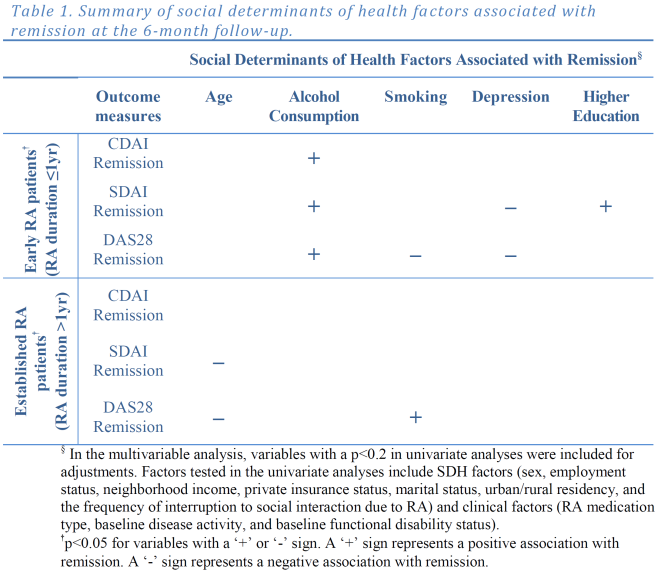Session Information
Date: Sunday, November 8, 2015
Session Type: ACR Poster Session A
Session Time: 9:00AM-11:00AM
Background/Purpose:
Treatment responses and outcomes vary among rheumatoid arthritis (RA) patients. There is limited evidence on the contribution of social determinants of health (SDH) to remission in RA. This study aimed to determine the contribution of socioeconomic, environmental, and behavioral factors to remission in RA patients.
Methods:
Data were collected from the Ontario Best-practices Research Initiative (OBRI) Rheumatoid Arthritis Registry, a Canadian clinical registry of early and established RA patients followed in routine care. Remission at the 6-month follow-up visit was measured by three ways, based on disease activity measures DAS28 (Disease Activity Score-28), SDAI (Simple Disease Activity Index) and CDAI (Clinical Disease Activity Index). The SDH variables assessed include age, sex, socioeconomic status, health behaviors, social support, living condition, and psychosocial factors. The association between these variables and remission was evaluated by logistic regression analyses, controlling for clinical factors such as RA duration, RA medications, baseline disease activity and functional disability. Subgroup analyses were performed on early RA, with disease duration ≤1year, and established RA patients respectively. All statistical analyses were performed in SAS9.4.
Results:
Out of the 2305 patients at cohort entry, 1291 reached the 6-month follow-up visit, at which time, 26.9% achieved CDAI remission, 40% achieved DAS28 remission, and 41% achieved SDAI remission. Among the 406 early RA patients, alcohol consumption was independently associated with CDAI (OR 1.76 95%CI 1.01-3.05), SDAI (OR 1.79 95%CI 1.01-3.17), and DAS28 remission (OR 1.77 95%CI 1.06-2.93), while depression was negatively associated with SDAI (OR 0.23 95%CI 0.08-0.65) and DAS28 remission (OR0.34 95%CI 0.15-0.80), after adjusting for confounders (Table 1). Such findings were not observed in established RA patients with >1 year of RA or in all patients (early and established RA) combined. With the exception of education in the early RA group (Table 1), none of the socioeconomic factors was significantly associated with remission.
Conclusion:
In early RA, remission at 6 months into cohort entry was positively associated with alcohol consumption and negatively associated with depression. Previous studies have found a protective effect of alcohol against developing RA1. This study shows in addition a protective effect of alcohol on RA remission. This highlights the potential role of health behaviors in achieving positive treatment outcomes.
1. Scott IC, Tan R, Stahl D, Steer S, Lewis CM, Cope AP. The protective effect of alcohol on developing rheumatoid arthritis: a systematic review and meta-analysis. Rheumatology (Oxford). 2013;52(5):856-867.
To cite this abstract in AMA style:
Cui K, Bombardier C, Tomlinson GA. Contributions of Social Determinants of Health on Probability of Remission in Early and Established Rheumatoid Arthritis Patients [abstract]. Arthritis Rheumatol. 2015; 67 (suppl 10). https://acrabstracts.org/abstract/contributions-of-social-determinants-of-health-on-probability-of-remission-in-early-and-established-rheumatoid-arthritis-patients/. Accessed .« Back to 2015 ACR/ARHP Annual Meeting
ACR Meeting Abstracts - https://acrabstracts.org/abstract/contributions-of-social-determinants-of-health-on-probability-of-remission-in-early-and-established-rheumatoid-arthritis-patients/

